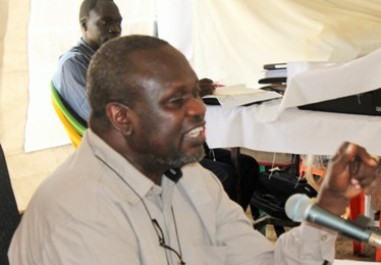SPLM-IO dismisses government allegation against their top leader
February 29, 2016 (ADDIS ABABA) – A recent allegation against Riek Machar, armed opposition leader and South Sudanese first vice president designate, that he is for the total destruction of his ethnic group, the Nuer, could not make any sense, says his media official.

Gai Yoach, a former militia and current spokesperson for the South Sudanese army (SPLA), in recent comments he made on the state-owned South Sudan Television (SSTV), alleged that Machar’s return to Juba will trigger another deadly “massacre of Nuer” civilians in the national capital.
Although Yoach, also a Nuer by ethnicity, could not explain who would again massacre the Nuer civilians in Juba upon return of the opposition leader, he alleged that Machar was not happy to see other Nuer civilians still alive and reside in the capital after the 15 December 2013 massacre.
He said the opposition leader signed the August 2015 peace agreement after 21 months of war not because he wanted peace, but to ensure that the remaining Nuer in Juba would be killed in a repeated violence upon his return soon.
Machar’s spokesperson however dismissed the comments as nonsensical, but wondered how such “violent inciting” comments were allowed to be aired on the national television.
“Such comments do not make sense at all. I could not grasp any sense out of the allegation. But they can incite violence against an ethnic group,” James Gatdet Dak, opposition leader’s spokesman, told Sudan Tribune on Monday.
He however added that it could be “anti-peace elements” within the government who might be planning for another massacre, but not the opposition faction.
Machar, he said, was a victim who narrowly escaped for his life as well as thousands of members of the Nuer ethnic group and others who were targeted and could not make it, but killed in Juba two years ago.
Dak said unless Yoach’s comments represented the official view of the government and the national army, the statements should have been investigated by President Kiir’s government, saying it was unfortunate the comments were uttered over the national television by a senior army officer.
Yoach’s video clip of the comments on SSTV have been circulated on the social media and published by some mainstream media outlets.
Thousands of civilians who were members of the Nuer ethnic group were massacred in cold blood in Juba during the December 2013 violence by forces loyal to President Kiir. Hundreds of thousands more have sought refuge in protection of civilians (PoCs) sites manned by the United Nations Mission in South Sudan (UNMISS) across the country.
Dak said Machar’s return to Juba aims to end the suffering of the people of South Sudan by forming a transitional government of national unity (TGoNU) which will, among other things, restore peace and stability and resettle the internally displaced persons (IDPs).
The top opposition leader is expected to return to Juba during the month of March upon deployment of his few thousands of troops in the capital as part of the security arrangements provided for in the peace deal.
Several senior political and military leaders of President Kiir’s government, including the army’s chief of general staff, Paul Malong Awan, are believed to be against the peace agreement and its implementation. However, those who have come out publicly denied allegations against the peace deal.
The peace accord, sponsored by the East African regional bloc, IGAD, brings to an end the two years of violence which occurred when debates over reforms and leadership succession within the ruling SPLM party turned violent in 2013.
Tens of thousands of people have been killed and 2 million more displaced internally and to the neighbouring countries of Sudan, Ethiopia, Kenya and Uganda.
(ST)
